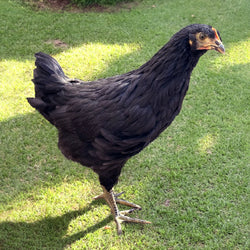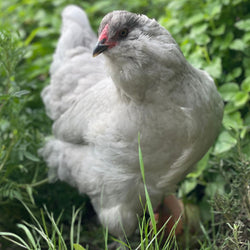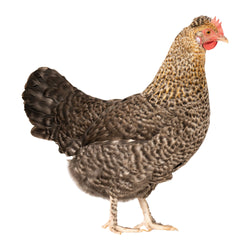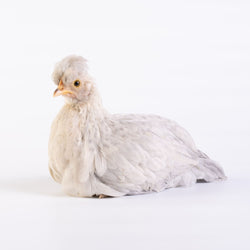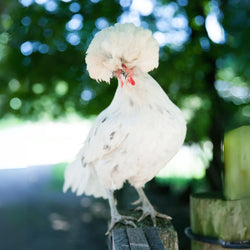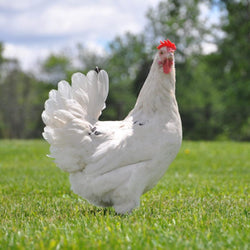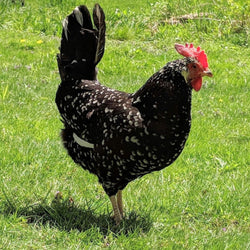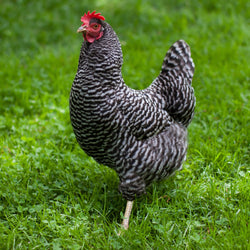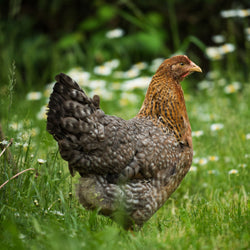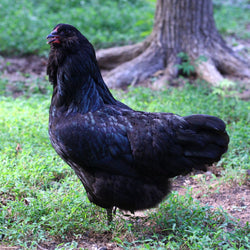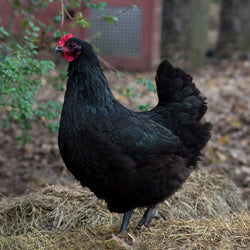page=4/--
Frequently Asked Questions
Here we answer the most commonly-asked questions about ordering, chicken care, and more.
How do I introduce new chickens into my old flock?
We get questions about this all the time! Let there be no doubt: adding new birds to your pre-existing crew can be stressful, both to you and the birds. Your flock, peaceful because every hen knows her place in the pecking order, will be thrown all out of whack by the addition of newcomers. Every hen and roo will once again have to vye for his or her spot on the pecking order. At times it can seem like all-out war! The good news: it only lasts about a week, and there are a few things you can do to...
Read MoreDo you have any tips to help me keep my coop sweet smelling in the heat of summer?
Obviously, keeping your coop cleaned and your bedding fresh is the best tip we can offer. Make sure to use pine shavings, and not straw: straw is not absorbent and rots quickly. That means it is just not the best bedding material unless you want to frequently clean your coop. But even when you use pine shavings, in the summertime, especially if it is humid, bedding can quickly get wet and release ammonia, which is bad for your birds. It can happen even when there is not much manure there, just because high humidity means it takes extra time for...
Read MoreAre there special preparations I should make if I want to have a broody hen adopt and raise my shipped chicks?
There is little more beautiful than a mother hen sheltering chicks beneath her wings. And there is little more efficient! If you have the luxury of having a broody hen to raise your chicks, you should totally take it. But there are some important things to be aware of! When you are having a broody hen raise new baby chicks that have been shipped to you, first remember that your hen has to be currently broody. If she is not broody when you try to introduce chicks to her, she may try to kill them, but she certainly won't adopt...
Read MoreHow many roosters can I have?
We normally recommend one rooster for every ten hens or so. In a large flock, there is often more than one rooster, with no problems. In smaller flocks, it's a greater risk. However, many breeders keep significantly greater numbers of roosters with their girls--one rooster for every two, or one for every five. We don't recommend it for the typical backyard chicken situation because there is always the risk that your girls will get overbred. However, if you do end up with more roosters than you bargained for, the good news is that it is still quite possible for your...
Read MoreWhy are my chickens molting late, and how can I help them stay warm?
Chickens molt annually, usually in the fall. But some chickens do molt later than others. Often this varies by breed as well as the conditions under which they live. Reasons your chickens may be molting late in the year: Your chickens begin molting when their bodies tell them it is time, and that is usually based on daylight hours. Decreasing day length is the normal trigger. Birds start at the end of August or beginning of September, while other breeds may wait until November or December. Adding light to their coop: Some people add light to keep their birds laying consistently...
Read MoreWhy are my chickens sleeping in their nest boxes rather than their roosts?
It's difficult for us to say exactly what might be inspiring them to do that without being able to inspect your coop, but we can give you some pointers that may assist you in solving the mystery. First, make sure your roosts are higher than your nests. If your nests are higher, your chickens will instinctively go for the highest place they can reach--do make sure it isn't too high for your chickens to easily reach, though! Second, make sure your roosts are comfortable for your birds. Although we tend to picture birds roosting on branches in the trees, most...
Read MoreHow can I make my coop well-ventilated, but not drafty?
This issue can be confusing, can't it? Try thinking of it this way: Generally, you might think of drafts as air that will blow directly onto your chickens through the coop at floor level where they stand, or at roost level where they sleep. Ventilation, on the other hand, simply permits air to move through the coop (overhead) but does not blow directly on the chickens. In the winter, chickens need protection from cold weather, which their feathers provide by keeping an insulating layer of warm air between their feathers and their body, trapped in their down. If they are...
Read MoreDo I need to bathe my chicken?
Generally speaking, no. Chickens don't need baths. However, if they do get something stuck in their feathers that they are not preening out, you can choose to bathe them. You may be especially interested in this if you want to show your chickens at a poultry exhibition. Keep in mind that bathing should be kept to a minimum, since shampoos can be drying to their feathers and make them brittle. If the dirt doesn't come out with simple water, you may want to try a pet bird shampoo like one you can find at your local pet store. These are...
Read More







"The Clubhouse" Coop
Easy to assemble and built to last, the Clubhouse Coop is the perfect starter coop for a small flock.
